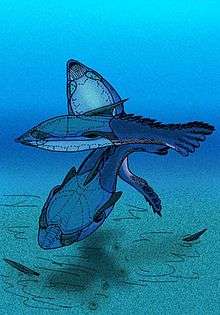Protopteraspididae
| Protopteraspididae Temporal range: Early Devonian | |
|---|---|
 | |
| Protopteraspis gosseleti | |
| Scientific classification | |
| Kingdom: | Animalia |
| Phylum: | Chordata |
| Class: | Pteraspidmorphi |
| Subclass: | Heterostraci |
| Order: | Pteraspidiformes |
| Family: | Protopteraspididae |
| Genera | |
| |
Protopteraspididae is an extinct family of pteraspidid heterostracan agnathans. Fossils of the various genera are found in early Devonian-aged marine strata. Protopteraspidids were once thought to represent a taxon of basal pteraspidids (hence "proto") but recent evaluations demonstrate that Protopteraspididae is a paraphyletic group of various transitional forms representing a gradual transition between the more advanced Pteraspoidei (comprising Pteraspididae, Gigantaspis and Protaspididae),[1] and the anchipteraspidids and the Psammosteids.
Genera
Protopteraspids are found in Lower Devonian marine strata of the Western United States, Northern Canada, England, France, Belgium, Svalbard, Norway, and Podolia, Ukraine.[2]
Protopteraspis
This genus is known from several species from Lower Devonian England, France and Belgium
Doryaspis
This is a genus of aberrant pteraspidids with lower lips elongated into long, dagger-like organs of unknown function. The various species are primarily restricted to the Lower Devonian strata of Svalbard.
"Trygonaspis"
"Trygonaspis" is a nomen nudum given to a beautifully preserved complete armor that strongly resembles Protopteraspis in form, but with a long, recurved dorsal spine, and orbital plates that have bookshelf-like extensions. The only known specimen was found in Northern Canada.
References
- ↑ Pernegre, Vincent N., and David K. Elliott. "Phylogeny of the Pteraspidiformes (Heterostraci), Silurian–Devonian jawless vertebrates." Zoologica Scripta 37.4 (2008): 391-403.
- ↑ Blieck, Alain. "Les hétérostracés Ptéraspidiformes, agnathes du Silurien-Dévonien du continent Nord-Atlantique et des blocs avoisinants: Révision systématique, phylogénie, biostratigraphie, biogéographie." (1984).